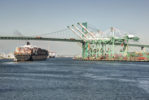
Visit Our Sponsors |
|
|
|
|
|
|
|
|
|
|
|
|
|
|
|
|
|
|
|
|
|
|
|
|
|
|
|
|
|
|
|
|
|
|
|
|
|
|
In retailing, the future is now. In fact, officials at Metro Group in Germany, particularly those in supply chain management, have been peering into the future since April 28, 2003. That's when the conglomerate turned one of its Extra supermarkets into the so-called Store of the Future to test RFID and a number of other technologies in real time and in real-life conditions. Simply put, Metro wanted to cut costs in its grocery operations, always an industry with paper-thin margins.
Its outlet in Rheinberg, not far from Metro's Düsseldorf headquarters, became the hothouse testing environment for smart shelves, RFID self-checkout systems, kiosks, smart scales and other leading-edge tech.
It hasn't been alone in the project. Supplier partners active in the experiment include Gillette, Kraft, Procter & Gamble, and almost 40 others. Technology partners are a stellar lineup as well: Microsoft, SAP, Intel, Cisco Systems, IBM, Philips Semiconductors and Intermec are just a few.
Results are not quite the trade secret that one might have expected. Metro hasn't been shy about sharing information on the project, even with competitors. And certain technologies and processes have been incorporated into other stores in the Metro pantheon.
Reportedly the world's fourth-largest retailer, Metro operates in almost 30 countries. Its brands include the Kaufhof Galleria department stores; a wholesale chain called Metro Cash & Carry, which is set to enter Pakistan early next year; the Extra and Real food stores; the Media Markt consumer electronics outlets; and Praktiker, its brand in home improvement. Group operations are said to generate 50bn euros (about $61.4bn) a year in revenue.
So what are the results? "Since the Metro Group Future Store initiative has several goals, a variety of metrics are needed to evaluate the success," says Juergen Homeyer, Metro corporate communications officer. The group "formulated a RFID business case" in 2003 with P&G and IBM. "The assumptions on which this study was based were checked in an extensive validation process in September 2005. Eleven Real stores, two Metro Cash & Carry stores and 3 [Metro Distribution Logistics] warehouses took part. Our expectations were confirmed, indeed, in some cases even exceeded: RFID and EDI result in significantly more efficient processes and lower costs, although only two of 11 steps in the process chain were taken into consideration. Projected for the whole of Germany, Metro Cash & Carry, Real and the distribution warehouses of the Metro Group could save 8.5m euros [$10.4m] annually."
Self-checkout systems, which allow customers to scan their own barcoded selections, have been incorporated into 50-plus Extra and Real stores. Info-Terminals, which provide detailed information on products, are in broad roll-out to other group stores. Says Homeyer: "Probably the next technology to make its way to other stores of the Metro Group is the 'intelligent scale.' It recognizes automatically what fruit or vegetable is weighed using a digital camera."
| "RFID increases efficiency significantly. However, it is not possible yet to quantify reductions in out-of-stocks." - Juergen Homeyer of Metro Group | |
| A Baker's Dozen of Benefits to Retailers |
| Metro officials say RFID and other technologies in the "future workshop" make retailing processes faster, more transparent and more effective. Ordering, delivery and warehousing are simplified, and merchandise can be tracked from one end of the supply chain to the other. Technology in the Store of the Future improves retailing processes in the following 13 ways: • Warehouse inventories can be monitored more accurately and replenishment orders passed faster. • Time losses due to mistaken supplies are excluded. • Deliveries to the Future Store will be faster, appreciably improving availability of the merchandise in the store. • Employees will recognize faster when shelves are about to run empty-hence "out-of-stock" will be a thing of the past. • By means of specific devices, the whereabouts of the merchandise can be accurately located at any time. • Inventories in warehouses and shop shelves are becoming more transparent. • In the Merchandise Management System, it is easier to determine at what time intervals and under what conditions goods are sold. • Quantities ordered can be controlled more accurately as a function of demand. • Manufacturers are in a better position to plan their production. • Less storage space is required, which will save warehousing and handling costs. • New types of service will increase customer loyalty to the supermarket and promote sales. • New electronic systems make price labeling better understood and more reliable. • The store can be better protected from theft. |
RELATED CONTENT
RELATED VIDEOS
Timely, incisive articles delivered directly to your inbox.






